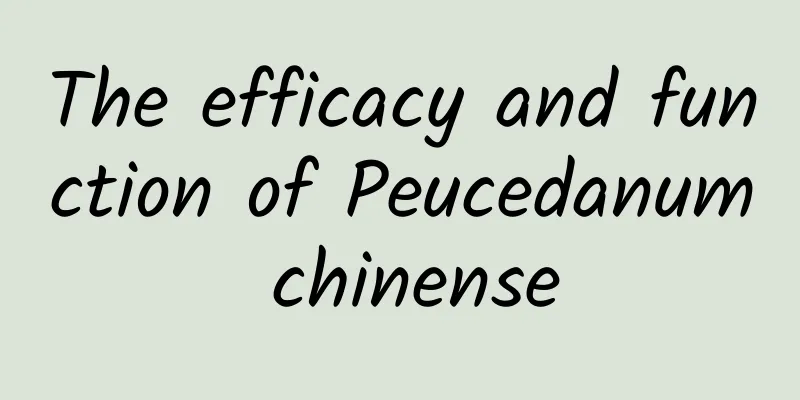The efficacy and function of Peucedanum chinense

|
Do you know what Peucedanum bungeana is? It is a kind of traditional Chinese medicine. There are many records about it in ancient medical books. Peucedanum bungeana has many medicinal values and can be used to treat some discomfort symptoms in our body. Let us learn about the effects and functions of Peucedanum bungeana in detail. 【English Name】 Binhai common hogfennel root [Source] Medicinal material source: The root of Peucedanum peucedanum of the Umbelliferae family. [Original form] Perennial sturdy herb, about 1m tall. Slightly upright. The roots are cylindrical, brown, branched, smooth and hairless. The basal leaves are long-petiolated and have broad leaf sheaths that clasp the stem; the leaf blades are thick, with a broad ovate-triangular outline, split into three parts once or twice, the first pinnae are ovate-round or triangular-round, the lower pair of pinnae petioles are 2-4cm long, the middle pinnae has three shallow lobes or deep pentagonal lobes, the base is cordate, and the length and width are both 7-9cm; the lateral lobes of the second pinnae are ovate, the middle lobe is obovate-cuneate, both are sessile, with 3-5 thick blunt serrations, both sides are smooth and hairless, pink-green, and the reticular veins are fine and clear. Umbel terminal or lateral, branched; peduncle stout; 2-3 bracts, ovate-lanceolate to linear-lanceolate, 5-10mm long, about 2mm wide, with soft hairs; central umbel diameter about 10cm; 15-30 rays, with fine soft hairs; umbel with more than 20 flowers; more than 8-10 bracts, linear-lanceolate; petals purple, rarely white, ovate to obovate, with small hard hairs on the back; ovary densely covered with short hard hairs; calyx teeth not prominent; stylopodium cylindrical. The fruit is oblong-ovate, flattened on the back, 4-6mm long, 2.5-4mm wide, with short hard hairs, linear dorsal ridges, slightly protruding, wing-shaped lateral ridges, slightly thick; there are 3-5 oil tubes in each groove, and 6-10 oil tubes on the commissure. The flowering period is June-July, and the fruiting period is August-September. [Habitat distribution] Ecological environment: Grown on coastal beaches or coastal mountains. : : : : : : : : : : : : : : : In addition, the plant also contains bergapten[7] and hamaudol[8]. 【Properties and flavors】 Spicy; Cold; Slightly toxic 【Entry into Meridians】 Enter the lung and bladder meridians 【Functions and indications】 Clears away heat and relieves cough; diuretic and detoxifying. Mainly used for lung heat cough; damp-heat stranguria pain; sore and carbuncle redness and swelling [Usage and Dosage] For oral administration, decocted in water, 9-15g. For external use: take appropriate amount and wash with decoction. 【Note】 Avoid excessive dosage for internal use. [Discussions by various scholars] "Xinhua Compendium of Materia Medica": Japan uses this as a windproof medicine. 【Excerpt】 Chinese Materia Medica From the above description, we can know that the nutritional value and medicinal value of Peucedanum japonicum are very high. It can treat some diseases and can also be used as a raw material for diet therapy. It is indeed a good choice for health and wellness. |
<<: The efficacy and function of sand fennel
>>: The efficacy and function of wound medicine
Recommend
Are there any "four-in-one" creatures in the water? The strange-looking Zhang's unicorn shrimp
Recently, the international journal "Contemp...
Anyone with a driver’s license can drive a 99A tank, so how is driving a helicopter any different?
When a helicopter flies low overhead, many people...
The efficacy and function of mint leaves
Medicine is very common in life. There are many k...
Eat 8,400 bacteria in one bite? A must-eat food in summer nearly killed a family of three!
Just ask yourself, in this hot summer season, who...
Travel 5 million kilometers across China!
Exceed 5 million km Highway Spreading all over Ch...
They sold you cancer, but said it was a way to keep healthy.
This article was reviewed by Pa Li Ze, chief phys...
A forest elf, a trio of high-pitched songs, what kind of mysterious bird is this?
A bird's eye view of science Quanzhou Associa...
The efficacy and function of sea mango
There are many common Chinese medicinal materials...
The efficacy and function of Populus tomentosa
Traditional Chinese medicine is very helpful in t...
How did ordinary garlic become the anti-cancer "warrior" among condiments?
Audit expert: Wang Guoyi Postdoctoral fellow in N...
If you are in a hurry, please take the stairs! It is not a good habit to walk on the left and stand on the right when taking the escalator →
Review expert: Wang Shengwei, Senior Engineer, Be...
The efficacy and function of duck celery fruit
Duck celery fruit is a very common Chinese medici...
What are the Chinese patent medicines for treating insomnia?
Insomnia is something that everyone has experienc...
The “knowns” and “unknowns” about asymptomatic infections
"Asymptomatic infections" have become a...
Does Schisandra chinensis have great beauty effects?
Since ancient times, Chinese medicine has always ...


![[Smart Farmer Illustration] A safe blood bank rooted in the fields - transgenic rice with human serum albumin gene](/upload/images/67f0a421ae3e5.webp)






